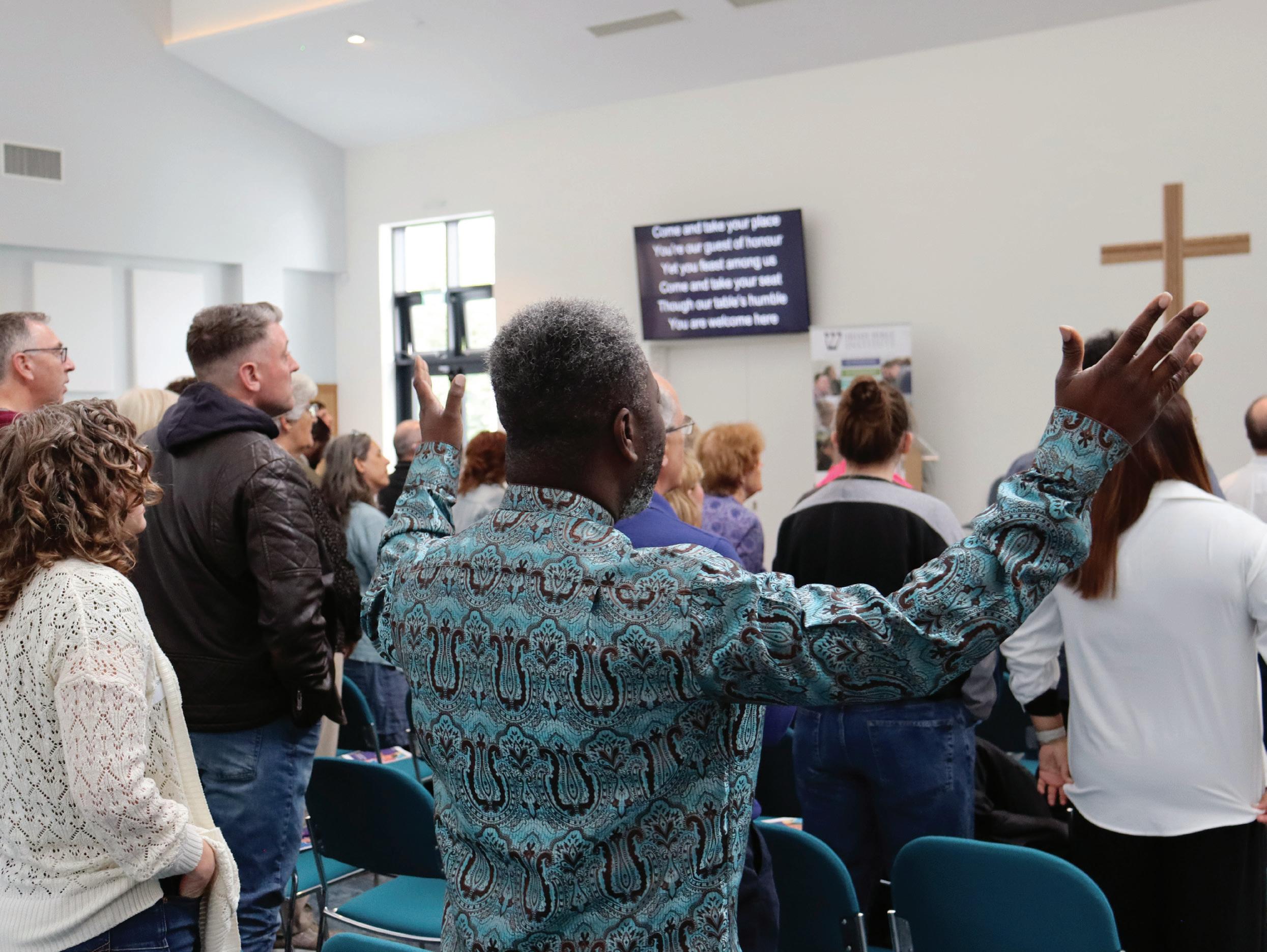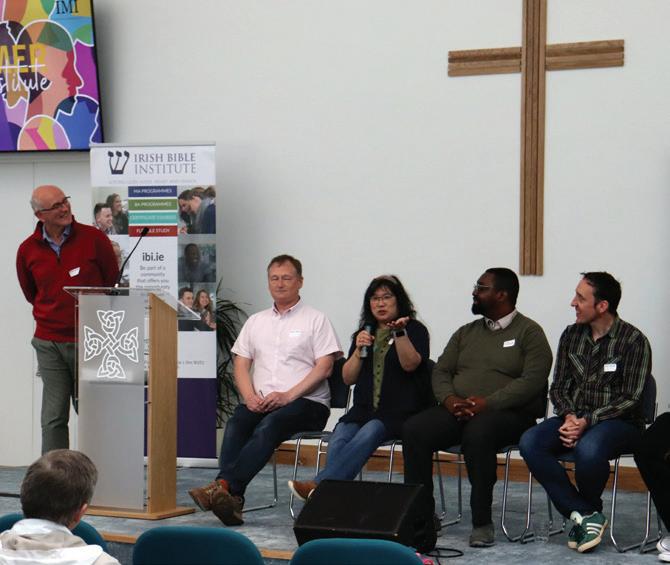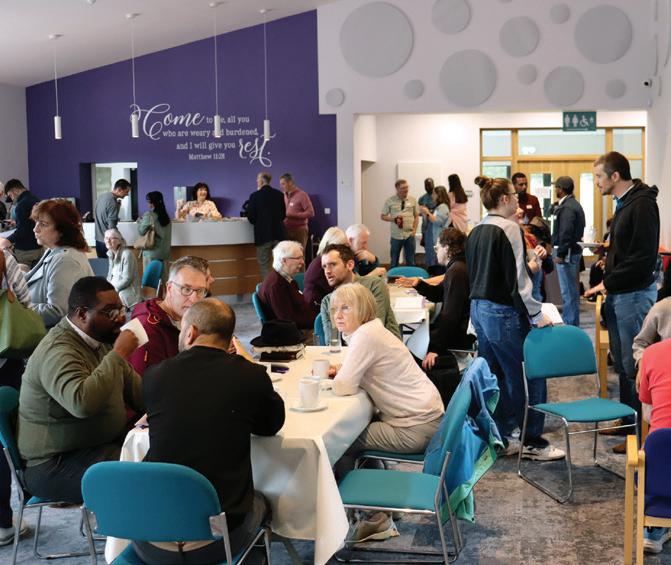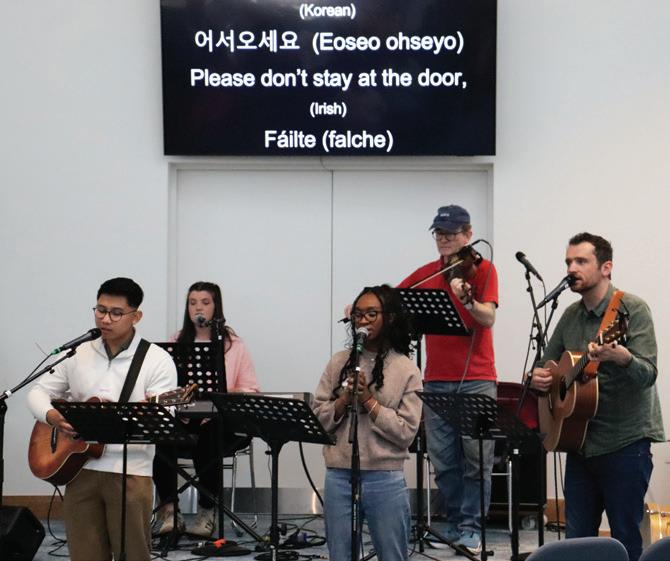
6 minute read
Being church in 21st century Ireland
Patrick Mitchel reflects on a recent conference held in Maynooth Community Church which considered how the church in Ireland can move from being multi-ethnic to intercultural.
In June, Irish Bible Institute (IBI) and Intercultural Ministries Ireland (IMI) co-hosted a rich and Spiritfilled gathering of people from all over Ireland at Maynooth Community Church – a day shaped by deep conversations, learning, and vibrant intercultural worship. The theme was ‘From Multi-Ethnic to Intercultural: Being church in 21st century Ireland’. There was much for participants to take away and apply in their own context. The main speaker was Nathaniel Jennings (OMF) whose keynote sessions set the scene for seminars led by experienced leaders in different areas. There was also space for lots of informal discussions and a Q&A session with a panel of leaders from different churches in Ireland. What follows is a primarily theological reflection on the event.
God’s rebuilding project
The story of the Tower of Babel in Genesis 11 is a deceptively relevant tale for our divided world. Humans, united through a common language, learn to cooperate to reach new heights (literally). Innovation leads to the invention of a radical new technology (the brick). Imaginations start to run wild as they begin to appreciate its apparently limitless potential. They say, “Come let us build ourselves a city, with a tower that reaches to the heavens so that we may make a name for ourselves and not be scattered over the face of the whole earth.”
We want churches that feel like fruit salads, not smoothies – diverse, distinct, and deeply connected.
In response, God intervenes in two ways. First, he confuses their language. Second, as they had feared, he scatters them over the face of the whole earth. This judgment is an act of mercy. No longer would they be able to dream of global domination. The tower remains unbuilt and human power is curtailed. Separated physically and linguistically, humanity is to learn afresh that we are finite creatures who need others to survive and flourish. “God’s judgment was the grace necessary to relearn the humility that ennobles” (Stanley Hauerwas).
But the human heart is stubborn and rebellious. The tragedy of our world is that we continue to repeat the sin of Babel ad nauseam. Rather than taking the path of humility and openness to the other, we seek power for ourselves. We fear and hate those who threaten our identity and our control over land and resources. This is why the history of the world is a history of violence and war between competing groups – whether nations, tribes or religious identities.
In his masterpiece, Exclusion and Embrace: A theological exploration of identity, otherness and reconciliation, the Croatian theologian Miroslav Volf discusses elimination and domination, two methods of exclusion. We are witnessing the terrible logic of elimination being worked out in Gaza as I write, by both Hamas and Israel. ‘Our’ territory, ‘our’ origins, ‘our’ culture, must be purified from the defiling presence of the other. Much of Western colonialism was, at heart, Babel writ large: pride in ‘our’ superiority coupled with violence against those considered inferior. ‘What is theirs is ours by right’. It often involved the eradication of the other’s culture, language and even very existence (the extermination of the entire aboriginal people of Tasmania for example). Closer to home, Ireland has its own bloody history of one side trying to eliminate the other. And what were recent house burnings in Ballymena other than a strategy of elimination?

Domination involves active strategies to subjugate and marginalise the other to ensure they remain in their ‘proper’ (inferior) place. Think of South African apartheid or Israel’s policies towards its Palestinian citizens or Chinese repression of Uyghur and Tibetan cultures or America’s racist history or Myanmar’s ethnic cleansing of its Rohingya population or Saudi Arabia’s imposition of Wahhabi Islam on its religious minorities or Malaysia’s official policy of Malay supremacy – we could name countless other examples. Humans are tribal at heart. I’m not listing these examples to be controversial but to make the point that all humans from every culture are tempted by Babel’s poisonous promise. We unite with others like us to build empires for ourselves that destroy others and corrupt ourselves in the process.

But here’s the good news! The great news that gives hope to our divided, violent world: God has his own rebuilding project.

Divine judgment at Babel leads to a promise made to a single individual, Abram of Ur, who responds in faith and leaves his homeland not knowing where he is going. That promise leads to the story of Israel and ultimately to its Messiah, the crucified and risen Lord of all nations. Jesus sends his Spirit who undoes what was done at Babel. At Pentecost it’s no accident that language barriers are overcome. Pentecost leads to the inclusion of the Gentiles who are also given the gift of the Spirit. The Spirit forms a new people, made of believers from every nation and culture and tribe. A new age has dawned. Boundaries have been broken, dividing walls demolished.
Theologically speaking, our citizenship is in heaven. That means we live here as guests, with humility, not ownership.
The calling of the church is to reflect this radical God-given unity in a world that continues to live under the shadow of Babel. The church is to be a place where our diversity enriches our unity and deepens love for one another. The church is to embody God’s rebuilding project – a place witnessing to God’s ultimate future healing of the nations. Where elimination and domination are overcome by grace, acceptance and forgiveness.
Becoming an intercultural church
All this sets an inspiring vision before churches today in an increasingly multi-cultural and diverse Ireland. Nathaniel described a Christcentred intercultural community as one “characterised by exchanges of ideas and the development of deep relationships of mutual dependency where differences of culture and background enrich rather than divide.” He used a memorable image: “We want churches that feel like fruit salads, not smoothies – diverse, distinct, and deeply connected.” Being an intercultural church is a journey not a destination and Nathaniel invited us to consider where our churches are on that journey.
This journey will not necessarily be easy. One of the seminar speakers, Rev Dr Israel Olojinfina, director of the UK’s Evangelical Alliance’s One People Commission, talked of a willingness to enter into relationships of ‘mutual inconvenience’. He said, “We are all migrants. Theologically speaking, our citizenship is in heaven. That means we live here as guests, with humility, not ownership.” Humility opens the door to listening and learning from each other.
For further resources see www.interculturalireland.org. The website also has information on a Global Disciples Gathering at Adelaide Road Presbyterian, Dublin on 6 December 2025.
Patrick Mitchel is Director of Learning and senior lecturer in Theology at the Irish Bible Institute and an elder in Maynooth Community Church.


